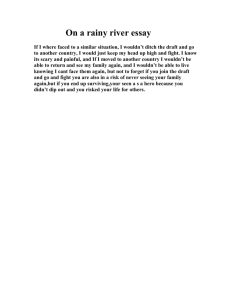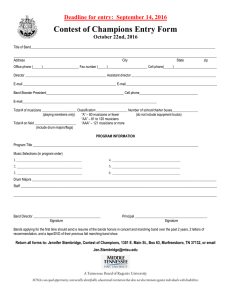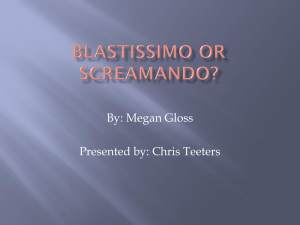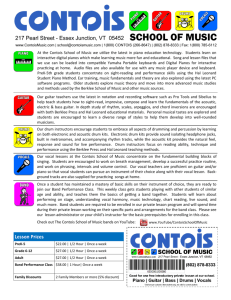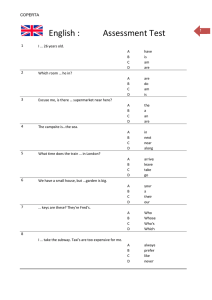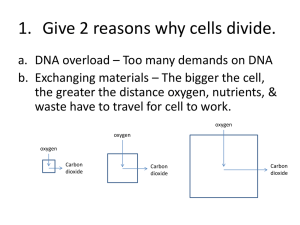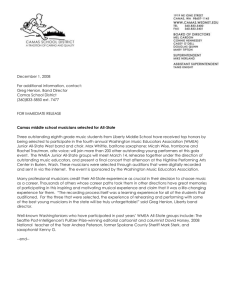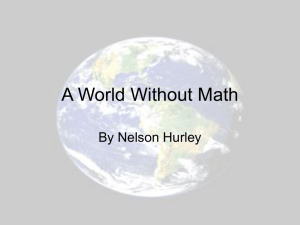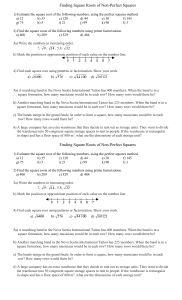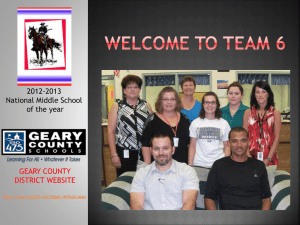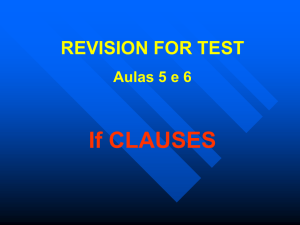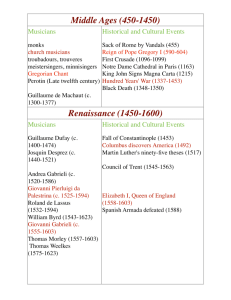Music Education: The Cornerstone to Developing a Well
advertisement
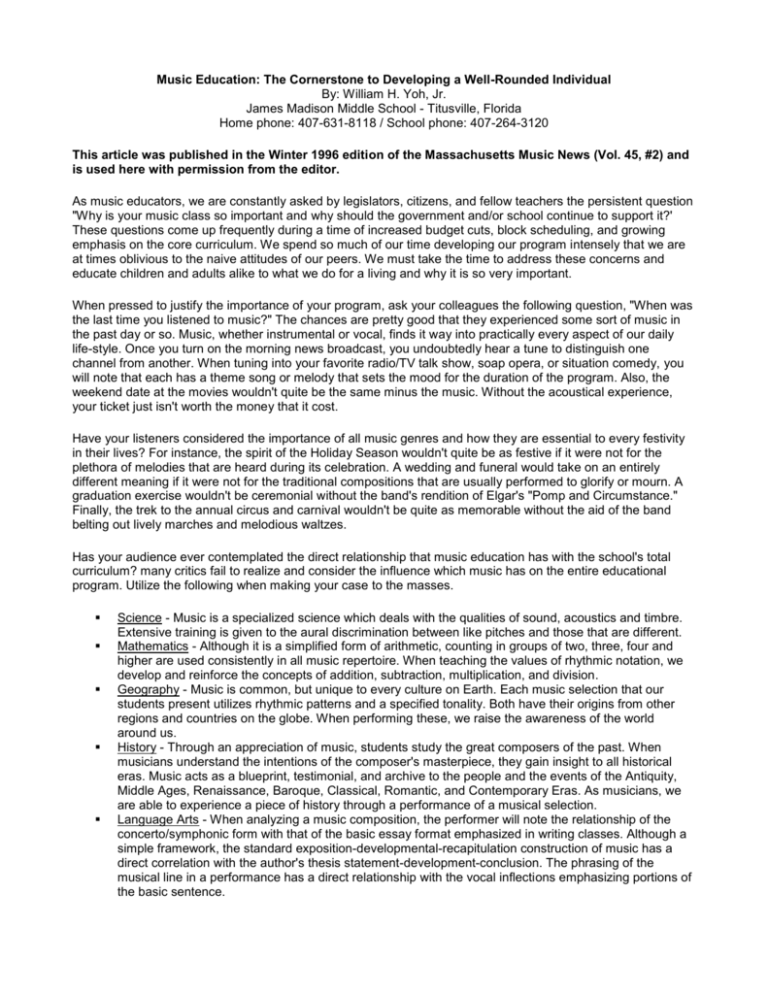
Music Education: The Cornerstone to Developing a Well-Rounded Individual By: William H. Yoh, Jr. James Madison Middle School - Titusville, Florida Home phone: 407-631-8118 / School phone: 407-264-3120 This article was published in the Winter 1996 edition of the Massachusetts Music News (Vol. 45, #2) and is used here with permission from the editor. As music educators, we are constantly asked by legislators, citizens, and fellow teachers the persistent question "Why is your music class so important and why should the government and/or school continue to support it?' These questions come up frequently during a time of increased budget cuts, block scheduling, and growing emphasis on the core curriculum. We spend so much of our time developing our program intensely that we are at times oblivious to the naive attitudes of our peers. We must take the time to address these concerns and educate children and adults alike to what we do for a living and why it is so very important. When pressed to justify the importance of your program, ask your colleagues the following question, "When was the last time you listened to music?" The chances are pretty good that they experienced some sort of music in the past day or so. Music, whether instrumental or vocal, finds it way into practically every aspect of our daily life-style. Once you turn on the morning news broadcast, you undoubtedly hear a tune to distinguish one channel from another. When tuning into your favorite radio/TV talk show, soap opera, or situation comedy, you will note that each has a theme song or melody that sets the mood for the duration of the program. Also, the weekend date at the movies wouldn't quite be the same minus the music. Without the acoustical experience, your ticket just isn't worth the money that it cost. Have your listeners considered the importance of all music genres and how they are essential to every festivity in their lives? For instance, the spirit of the Holiday Season wouldn't quite be as festive if it were not for the plethora of melodies that are heard during its celebration. A wedding and funeral would take on an entirely different meaning if it were not for the traditional compositions that are usually performed to glorify or mourn. A graduation exercise wouldn't be ceremonial without the band's rendition of Elgar's "Pomp and Circumstance." Finally, the trek to the annual circus and carnival wouldn't be quite as memorable without the aid of the band belting out lively marches and melodious waltzes. Has your audience ever contemplated the direct relationship that music education has with the school's total curriculum? many critics fail to realize and consider the influence which music has on the entire educational program. Utilize the following when making your case to the masses. Science - Music is a specialized science which deals with the qualities of sound, acoustics and timbre. Extensive training is given to the aural discrimination between like pitches and those that are different. Mathematics - Although it is a simplified form of arithmetic, counting in groups of two, three, four and higher are used consistently in all music repertoire. When teaching the values of rhythmic notation, we develop and reinforce the concepts of addition, subtraction, multiplication, and division. Geography - Music is common, but unique to every culture on Earth. Each music selection that our students present utilizes rhythmic patterns and a specified tonality. Both have their origins from other regions and countries on the globe. When performing these, we raise the awareness of the world around us. History - Through an appreciation of music, students study the great composers of the past. When musicians understand the intentions of the composer's masterpiece, they gain insight to all historical eras. Music acts as a blueprint, testimonial, and archive to the people and the events of the Antiquity, Middle Ages, Renaissance, Baroque, Classical, Romantic, and Contemporary Eras. As musicians, we are able to experience a piece of history through a performance of a musical selection. Language Arts - When analyzing a music composition, the performer will note the relationship of the concerto/symphonic form with that of the basic essay format emphasized in writing classes. Although a simple framework, the standard exposition-developmental-recapitulation construction of music has a direct correlation with the author's thesis statement-development-conclusion. The phrasing of the musical line in a performance has a direct relationship with the vocal inflections emphasizing portions of the basic sentence. Foreign Language - The music which our ensembles perform has its inception from western European civilization. With an awareness of the terminology printed throughout the sheet music, performers gain significant knowledge in the Italian language. Depending on the selection's difficulty and composer, German, French and Spanish terms may be introduced. As a result of the terminology, musicians understand the similarities between English and the Romantic/Germanic languages. The root words, prefixes, and suffixes located in the foreign language find their way directly into the English derivative. This goes a long way in building a strong vocabulary base, and will inevitably improve the students' all important standardized test scores. Physical Education - When starting and developing the wind and vocal musician, a significant amount of time is spent on developing proper breath support and appropriate respiratory habits. Rehearsals, if properly orchestrated, are as intensive and exhaustive as jogging and swimming laps. In addition, motor skills are advanced substantially when playing percussion, woodwind, brass and string instruments. As with all sports organizations, the concepts of teamwork and cooperation are exploited in the band, orchestra and chorus setting. Music is the universal language which establishes a common bond among all subjects and people. It evokes passionate emotions in the heart and rekindles vibrant memories of the mind. With the enormous impact that music has on every aspect of our lives, it would make sense to fervently develop and advance our music programs. Instead, excuses are made and methods are devised to remove an essential portion of the human soul. Emphasizing and enhancing music education will expand the students' knowledge in a variety of subjects, improve their test scores, and release the human spirts.
